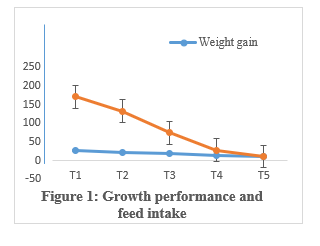IMPACTS OF INGESTED MICROPLASTICS ON THE GROWTH PERFORMANCE AND RATE OF FEED CONSUMPTION OF AFRICAN CATFISH Clarias gariepinus
The use of plastics for various objects has tremendously increased over the years. This result to vast numbers of plastics debris in the environment. Plastics wastes are the most common sea debris constitute over 70% of all ocean debris.
The effects of ingested microplastics on the growth rate and the rate of feed consumption of C. gariepinus was tested in this study. (150) juvenile C. gariepinus with average weight of 27.4g were exposed to microplastics and 2mm compounded feed at different levels. Five treatments (T) replicated in triplicate were stocked with ten fish. The fish in each treatment were fed 5% of their body weight 2 times per day for 8 weeks with various level of prepared microplastics (MP) and 14g of compounded feed (CF). T1, T2, T3, T4 and T5 were fed with 0, 4, 6, 8, 10g MP respectively. Highest weight gain of 26.07±6.8g was observed in T1 followed by T2, T3, T4 and T5 with a mean weight gain of 21.83±2.0, 18.53±1.5, 13.82±8.0 and 10.54±5.7g respectively. The result of the feed intake shows that fish in T1 consumed the highest feed though, not exposed to microplastics while fish in T2, T3, T4, and T5 consumed 132.40±6.9, 74.09±5.1, 28.2.6±1.7 and 11.10±3.8g respectively. There was a significant difference (p<0.05) in the weight gain and in the feed intake of the fish among the treatments. Across the treatments, the fish mortality ranged from 20 to 100%. 20% mortality was recorded in T1 (control). 50% mortality was recorded in T2 while 100% mortality was recorded in T3, T4 and T5. The results from this research show that ingested microplastics have significant effects on thegrowth performance and the rate of feed consumption of C. gariepinus
